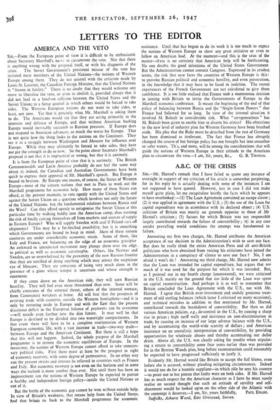A.B.C. OF THE CRISIS
SIR,—Mr. Harrod's remark that I have failed to quote any instance of oversight in support of my criticism of his article is somewhat perplexing, for in his reply he is actually dealing with some of the instances I am not supposed to have quoted. However, just in case I did not make myself quite plain, let me recapitulate briefly the facts which he appears
to have overlooked : —(1) The Loan Agreement contained an escape clause ; (2) it was applied in agreement with the U.S. ; (3) the use of the Loan for capital expenditure was in accordance with its declared object ; (4) U.S. criticism of Britain was mostly on grounds opposite to those of Mr Harrod's criticism ; (5) factors for which Britain was not responsible largely contributed towards the failure of convertibility ; (6) in any case amidst prevailing world conditions the attempt was foredoomed to failure.
Answering my first two charges, Mr. Harrod attributes the American acceptance of our decision to the Administration's wish to save our face.
But does he really think the entire American Press and all anti-British politicians who have abstained from voicing his criticisms have joined the Administration in a conspiracy of silence to save our face ? No, I am afraid it won't do ! Answering my third charge, Mr. Harrod now admits that the Loan was intended for capital expenditure, but argues that too much of it was used for the purpose for which 'it was intended. But, as I pointed out in my fourth charge (unanswered), we were criticised in the U.S. mainly on the ground that too little of the Loan was spent on capital reconstruction. And perhaps it is as well to remember that Britain concluded the Loan Agreement with the U.S., not with Mr.
Harrod. I agree that British over-investment and unduly generous treat- ment of old sterling balances (which latter I criticised on many occasions), and technical mistakes in addition to that mentioned by Mr. Harrod, contributed towards the breakdown of convertibility. But then so did various American policies, e.g., de-control in the U.S., by causing a sharp rise in prices ; high tariff walls and insistence on non-discrimination in trade, by causing an increase of our large adverse balance with the U.S., and by accentuating the world-wide scarcity of dollars ; and American insistence on an unrealistic interpretation of convertibility, by providing opportunities for wholesale abuses and thereby accentuating our dollar drain. Above all, the U.S. was clearly asking for trouble when stipulat- ing a return to convertibility some four years earlier than was provided for in the Bretton Woods plan, long before reconstruction could reasonably be expected to have progressed sufficiently to justfy it.
Evidently Mr. Harrod would like Britain to accept the full blame, even before she is accused, without pleading mitigating circumstances. Indeed it would not do for a humble suppliant—in which role he sees his country —to point out to her patron that faults were on both sides. If Mr. Harrod has as much respect for the American character as I have he must surely realise on second thought that such an attitude of servility and self- abasement would be looked upon on the other side of the Atlantic with the contempt it deserves.—I am, Sir, yours faithfully, PAUL EINZIG. Suffolk, Ashurst Wood, East Grinstead, Sussex.


































 Previous page
Previous page